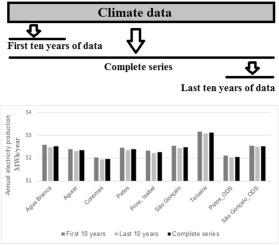当前位置:
X-MOL 学术
›
J. Arid Environ.
›
论文详情
Our official English website, www.x-mol.net, welcomes your
feedback! (Note: you will need to create a separate account there.)
Influence of climatic variability on the electricity generation potential by renewable sources in the Brazilian semi-arid region
Journal of Arid Environments ( IF 2.6 ) Pub Date : 2021-01-01 , DOI: 10.1016/j.jaridenv.2020.104331 Susane Eterna Leite Medeiros , Priscila Farias Nilo , Louise Pereira Silva , Carlos Antonio Costa Santos , Monica Carvalho , Raphael Abrahão
Journal of Arid Environments ( IF 2.6 ) Pub Date : 2021-01-01 , DOI: 10.1016/j.jaridenv.2020.104331 Susane Eterna Leite Medeiros , Priscila Farias Nilo , Louise Pereira Silva , Carlos Antonio Costa Santos , Monica Carvalho , Raphael Abrahão

|
Abstract Brazil presents favorable geographic conditions for the exploitation of renewable energy sources. Although the national electricity mix is predominantly hydroelectricity-based, increasing participation of solar energy has been observed. The availability and reliability of the electricity sector are intrinsically intertwined with climate conditions and can be influenced by its changes. The study presented herein investigates the effect of observed climate changes on the potential of electricity generation from photovoltaic solar and hydroelectric sources, in the semi-arid region of the Paraiba state (Northeast Brazil). The study area includes a Small Hydroelectric Power Plant (SHPP), and solar photovoltaic plants are currently being installed. Trend analysis revealed that total rainfall increased by 3.43 mm/year for the SHPP site during the studied period; however, electricity generation decreased by 3.23 MWh/year as water use was prioritized for human and irrigation purposes. Due to intense solar radiation, the study area presents favorable opportunities for the implementation of photovoltaic solar generation technologies. The increases verified in average air temperature did not affect the solar electricity generation significantly. The consideration of climate trends can help in the planning of energy systems, as climate variability can result in considerable fluctuations in renewable electricity generation, leading to disruption in energy supply.
中文翻译:

气候变化对巴西半干旱地区可再生能源发电潜力的影响
摘要 巴西为开发可再生能源提供了有利的地理条件。尽管国家电力结构主要以水电为基础,但已经观察到太阳能越来越多地参与其中。电力部门的可用性和可靠性与气候条件有着内在的联系,并且会受到气候变化的影响。本文介绍的研究调查了观测到的气候变化对帕拉伊巴州(巴西东北部)半干旱地区光伏太阳能和水力发电潜力的影响。研究区域包括一个小型水力发电厂(SHPP),目前正在安装太阳能光伏发电厂。趋势分析显示,总降雨量增加了3。SHPP 站点在研究期间为 43 毫米/年;然而,由于水资源优先用于人类和灌溉目的,发电量减少了 3.23 MWh/年。由于强烈的太阳辐射,研究区为实施光伏太阳能发电技术提供了有利的机会。经验证的平均气温升高对太阳能发电没有显着影响。考虑气候趋势有助于能源系统的规划,因为气候变化会导致可再生能源发电量出现相当大的波动,从而导致能源供应中断。该研究区为实施光伏太阳能发电技术提供了有利机会。经验证的平均气温升高对太阳能发电没有显着影响。考虑气候趋势有助于能源系统的规划,因为气候变化会导致可再生能源发电量出现相当大的波动,从而导致能源供应中断。该研究区为实施光伏太阳能发电技术提供了有利机会。经验证的平均气温升高对太阳能发电没有显着影响。考虑气候趋势有助于能源系统的规划,因为气候变化会导致可再生能源发电量出现相当大的波动,从而导致能源供应中断。
更新日期:2021-01-01
中文翻译:

气候变化对巴西半干旱地区可再生能源发电潜力的影响
摘要 巴西为开发可再生能源提供了有利的地理条件。尽管国家电力结构主要以水电为基础,但已经观察到太阳能越来越多地参与其中。电力部门的可用性和可靠性与气候条件有着内在的联系,并且会受到气候变化的影响。本文介绍的研究调查了观测到的气候变化对帕拉伊巴州(巴西东北部)半干旱地区光伏太阳能和水力发电潜力的影响。研究区域包括一个小型水力发电厂(SHPP),目前正在安装太阳能光伏发电厂。趋势分析显示,总降雨量增加了3。SHPP 站点在研究期间为 43 毫米/年;然而,由于水资源优先用于人类和灌溉目的,发电量减少了 3.23 MWh/年。由于强烈的太阳辐射,研究区为实施光伏太阳能发电技术提供了有利的机会。经验证的平均气温升高对太阳能发电没有显着影响。考虑气候趋势有助于能源系统的规划,因为气候变化会导致可再生能源发电量出现相当大的波动,从而导致能源供应中断。该研究区为实施光伏太阳能发电技术提供了有利机会。经验证的平均气温升高对太阳能发电没有显着影响。考虑气候趋势有助于能源系统的规划,因为气候变化会导致可再生能源发电量出现相当大的波动,从而导致能源供应中断。该研究区为实施光伏太阳能发电技术提供了有利机会。经验证的平均气温升高对太阳能发电没有显着影响。考虑气候趋势有助于能源系统的规划,因为气候变化会导致可再生能源发电量出现相当大的波动,从而导致能源供应中断。











































 京公网安备 11010802027423号
京公网安备 11010802027423号